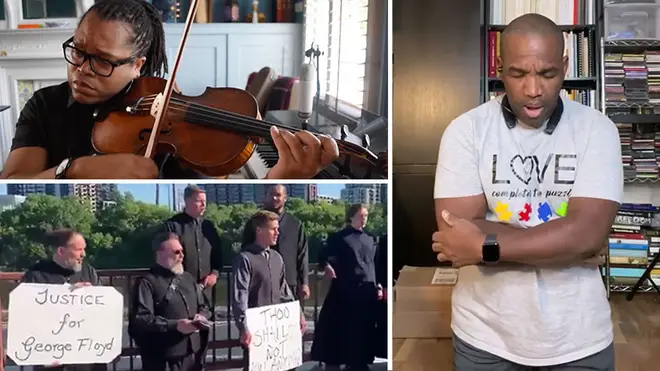‘We cannot remain silent’ – musicians protest against George Floyd’s death and police brutality
1 June 2020, 13:27

Musicians around the world are using their voices and instruments to protest against the death of George Floyd, and to speak out against racism and police brutality.
Singers and musicians are using their platforms to protest the tragic murder of George Floyd, and to put a spotlight on some of the historic hate crimes committed against black Americans.
On 25 May George Floyd, an African American man, was killed at the hands of a white Minneapolis police officer. Officer Derek Chauvin, who was seen kneeling on Floyd’s neck for several minutes, has been charged with his death. A lawyer for the Floyd family has since accused Chauvin of premeditated murder.
Floyd’s death has sparked protests across the US – and globally – against racism and police brutality, many under the banner of the Black Lives Matter movement. The Floyd case has reignited anger over police killings of black Americans, following the high-profile cases of Michael Brown in Ferguson, Eric Garner in New York and others that have driven the movement.
A number of musicians have been joining the protests, in singing and playing in their homes. Many of their videos have come in response to a call from the New York Philharmonic’s Principal Clarinet, Anthony McGill, to #TakeTwoKnees.
Read more: US orchestra fires trombonist after racist posts about Floyd protests >
McGill started the initiative on 30 May, posting a video of himself playing his instrument before dropping to his knees in a prayer for “justice and decency”. The clarinettist encouraged friends and musicians to join him in putting “a spotlight on this evil”, by posting their own performance videos.
“Let’s try and #TakeTwoKnees in the struggle for justice and decency,” McGill writes. “No guidelines. Your message, your voice, your mission, your focus. Just #TakeTwoKnees for what you believe in.”
Some powerful responses emerged, including from opera singer Lawrence Brownlee, who sang the final verse from Johnny Cash’s song ‘There’s a Man Going ‘Round Taking Names’ on his knees.
The New York Phil posted a statement in support of McGill’s initiative, saying: “We post this in outrage and sadness over what has occurred in Minnesota and beyond, and for what has been a part of this nation’s history. We post this in solidarity to remind ourselves that America can and should be better than this. We cannot remain silent.”
Sign the change.org petition, Justice for George Floyd >
Since protests against Floyd’s death began, we’ve also seen choirs taking to the streets.
A video from ChoirBuzz on Facebook shows a church choir peacefully singing and protesting for justice in Minneapolis, while holding up signs which read “Justice for George Floyd”, “Thou shalt not kill any man”, “Can’t breathe” and “Standing against systems of oppression”.
Another video, reported on by Fox News, shows the Church of God choir singing at the Justice for George Floyd rally at 38th and Chicago in Minneapolis, on Saturday afternoon.
Added to this, a powerful statement from jazz trumpeter Wynton Marsalis, published on Facebook yesterday (30 May), concluded: “This is about all of us rejecting the injustices of our collective past with consistent and relentless individual action that goes far beyond giving money.
“This is my response to injustice in our country and the world across the last forty years.”
Attached to the post, Marsalis shared five of his album covers, each one celebrating music born from African American musical tradition and African American stories, including his 1997 Pulitzer Prize-winning jazz oratorio about a couple’s journey from slavery to freedom, Blood on the Fields.
Read his full post below.


































